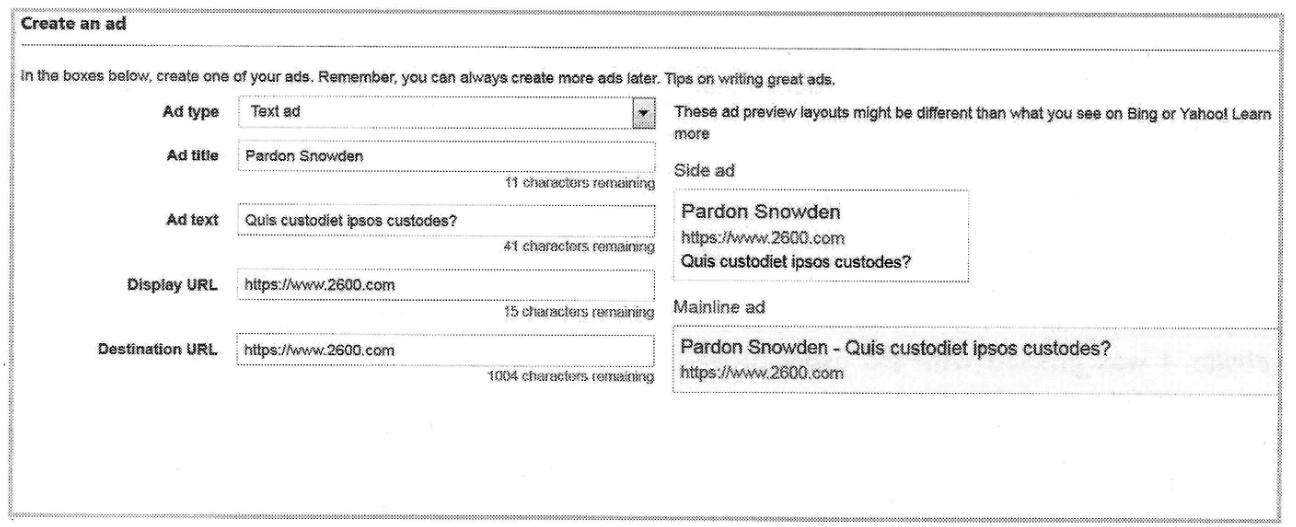Pre-Surveillance of Law Enforcement Using Targeted Advertising
by Deflagrati0n
Recently I finished the quintessential hacker book Ghost in the Wires by Kevin Mitnick.
One particular tactic used by Mitnick in the book stood out to me.
He used a police scanner to monitor the frequencies used by the FBI to determine whenever they were close. Inherent in any radio communications is that all unencrypted traffic on a VHF/UHF two-way radio is broadcast to the entire public.
This gave me an idea!
Advertising on search engines works much the same way. You cannot send advertisements only to one user; you have to target specific users based on keywords, geographic location, gender, device type, etc. Also, search engines invariably report advertising statistics to their advertisers in order to help them improve their ads.
I've been using targeted advertising for the better part of two years in order to generate referral credits to the various applications that make up the modern smartphone APPocalypse, such as ride-sharing, room-sharing, mobile payments, cloud storage, etc. (be sure to read the TOS to ensure this complies!).
The very next day, after finishing Ghost in the Wires, I was taking a shower and a thought struck me: Targeted advertising could be used to determine if and when law enforcement offices are using public search engines to check up on you!
Keywords would include your own usernames, IRL name, or any unique words or phrases connected only to you that you are worried might be catching the attention of law enforcement.
My example uses Bing Ads, since that is what I use for my referral advertising.
Bing Ads has some advantages price-wise, in addition to being the default search engine in Internet Explorer. (There are plenty of tutorials online to show you how to use both Bing Ads and Google AdWords.) Non-tech-savvy users are more likely not to change the default search engine. They are also more likely to click on search engine advertisements that look similar to legitimate search results. In this case, we do not really care about getting the law enforcement agents or police officers to click on the ads, so much as we want our ads shown when these law enforcement agencies search for our advertisements. These are called "impressions" in online advertising speak.
Whenever one of your ads appears in the search results, it registers in Bing Ads as an impression. A handy summary table shows you all of the impressions you have had over a specified time period. Thus, not only will you be able to see if you've been searched for, but also exactly when you've been searched for.
Targeting the law enforcement agencies themselves is fairly simple.
Under "Location", click Advanced targeting and click Radius targeting.
Change the default 20 mile radius to the minimum of one mile. Then put the address you want to target in the search bar and hit search. Click on Target and wah-lah!
Anytime someone within a mile of this address searches for your keywords, it will show up in an impression. In this post-Snowden era of NSA surveillance, I suggest using a nearby address rather than the exact address to ensure this sort of activity cannot be easily flagged. Of course, this works best on keywords that will not generate false positives.
What to show for your advertisement is up to you.
If you want to get under their skin, you can put something like, "Hey Feds, I know you're watching me!" with a link to Rick Astley's "Never Going to Give You Up" YouTube video or a link to the nearest donut shop.
An unscrupulous attacker might also be able to set up a honeypot or malicious website which would target law enforcement officers who clicked on this advertisement. Bing Ads probably scans the target links for such malicious code so the viability of this tactic may be limited. The same tactic could be applied to Google AdWords, and indeed if you were truly interested in determining if somebody was checking on you, you would want to be running advertising campaigns on both search networks simultaneously.
This article should serve as a warning to all law enforcement and security agencies using public search engines: Your searches are not private if advertisements can target keywords within your searches.
Using this method, nefarious persons could simply disappear the first time you search their name. Even targeted advertising opt-out browser plugins will not prevent this type of surveillance since ads will still target you based on search term alone. Even the more "privacy oriented" search engines like DuckDuckGo use Bing Ads to generate revenue.
This technique has many possible uses including law enforcement counter-surveillance, corporate espionage counter-surveillance, or even online activism.
Targeted advertising is simply a tool, and like all tools it is up to the user whether it will be used for good or for evil.


